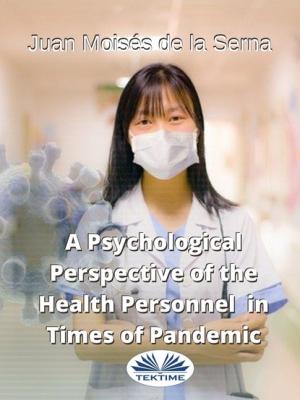A Psychological Perspective Of The Health Personnel In Times Of Pandemic. Juan Moisés De La Serna
Читать онлайн.| Название | A Psychological Perspective Of The Health Personnel In Times Of Pandemic |
|---|---|
| Автор произведения | Juan Moisés De La Serna |
| Жанр | Медицина |
| Серия | |
| Издательство | Медицина |
| Год выпуска | 0 |
| isbn | 9788835412182 |
A Psychological Perspective
of
Health Personnel
in
Times of Pandemic
Juan Moisés de la Serna
Translated by Lauren Izquierdo
Tektime Editorial
2020
“A Psychological Perspective of the Health Personnel in Times of Pandemic”
Written by Juan Moisés de la Serna
Translated by Lauren Izquierdo
1st edition: May 2020
© Juan Moisés de la Serna, 2020
© Tektime Editions, 2020
All rights reserved
Distributed by Tektime
The total or partial reproduction of this book, nor its incorporation into a computer system, nor its transmission in any form or by any means, be it electronic, mechanical, by photocopy, by recording or other means, is not allowed, without prior permission and in writing from the editor. The infringement of the aforementioned rights may constitute a crime against intellectual property (Art. 270 and following of the Penal Code).
Contact CEDRO (Spanish Center for Reprographic Rights) if you need to photocopy or scan any fragment of this work. You can contact CEDRO through the web www.conlicencia.com or by phone at: 91-702-19-70 /93 272 04 47.
Prologue
Afterward the successful reception of the book entitled “Psychological Aspects in Times of Pandemic” where a number of issues from the perspective of psychological science are addressed, related to the impact of the appearance of COVID-19 on the lives of citizens, and afore readers´ insistent request for a text focused on health personnel, from there came this book.
The purpose of this, it is to offer updated information on the psychological aspects of who have been described as the battlefront against the advance of COVID-19 from a perspective of scientific psychology, for which reference will be made to the latest publications in this regard.
A rigorous and up-to-date vision of the contributions of the science of psychology told in a way that is accessible to everyone, with the aim of helping to understand the emotional impact of this situation on health personnel, as well as the present and future consequences of the same.
Homage
Although it may be obvious, to speak of the health personnel is to speak of those who are in charge of health, whether physical or mental, and depending on how the distinction between professions and specialties within the health field is established in each country.
Perhaps the most notable difference in a hospital may be between health personnel versus non-health personnel, in this first case being the doctors, nurses and assistants; while within the category of non-health, management and administration personnel would be included, as well as support personnel such as orderlies, guards and even cleaning personnel, all of them essential for a more or less large health center to function conveniently.
The previous distinction is not trivial but has been brought up, because although the text focuses on health personnel in times of pandemic, it should not be forgotten that they can carry out their work thanks to the entire human team that is supporting them and collaborating with them; sometimes being “invisible” for patients and relatives, but as indicated before, they are of essential importance
Illustration 1 Tweet Thanking Personnel
Dedicated to my parents
Changes in the healthcare system
Chapter 2. Reaction to COVID-19
Social phenomena
Chapter 3. Impact of COVID-19 on Healthcare Personnel
Depression in Healthcare Personnel
Anxiety in Healthcare Personnel
Sleeping Problems in Healthcare Personnel
Resilience in Healthcare Personnel
List of Illustrations
References
Conclusions
Chapter I. Contextualizing
Before going deeper about the psychological and emotional impact of COVID-19 on Healthcare Personnel, this work must be contextualized within the framework of a pandemic that affects globally and without precedent in modern history. It has been putting in check to each one of the health systems as it has affected the population.
Despite seeing its consequences in China, where it began, sometimes, until the first cases were counted in each territory, the governments did not begin to take measures in this regard.
A chronology that has barely started a few months ago and that has been affecting more and more countries. The first cases were imported, by citizens from affected areas, who have unknowingly spread the virus around the world.
A situation in which each government have taken different measures, but in all cases, the fight for the eradication of the virus has been in charge of Health Personnel yet at risk of their own lives in the caring of patients who came requiring health care, many times, with urgency.
Healthcare in Europe
Health Personnel can be differentiated according to the category given to them in each country. For example, between medical and nursing personnel, professionals who perform complementary functions, but whose percentage of the population vary depending on the European country which is being talked about.
Thus, and in the specific case of Spain, this is above the European average in terms of the number of medical professionals working in healthcare, this average is 3.6 per 1,000 inhabitants in 2019; while in the case of nurses, Spain is below the average, whose percentage in 2019 at the European level was 8.5 per 1,000 inhabitants.
Greece, Austria and Portugal are the countries with a higher ratio of doctors in the European Union, and those with a lower ratio, Poland, Romania and England.
Regarding the nursing community, among the countries with a higher ratio per 1,000 inhabitants are Norway, Iceland and Finland, while those with the lowest ratios in the European Union are Greece, Bulgaria and Lithuania.
Illustration 2 Health Personnel in Europe
It is necessary
